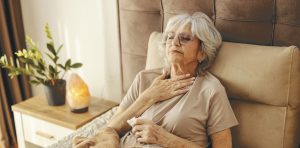By Julie S. Hurst- Nicoll, MBA, CMI, CMR – President, American Mold Experts
 Mold can have significant effects on the health of elderly individuals, particularly those with pre-existing conditions or compromised immune systems.
Mold can have significant effects on the health of elderly individuals, particularly those with pre-existing conditions or compromised immune systems.
Mold, a type of fungus that thrives in damp and humid environments, can pose serious health risks to people of all ages. However, the elderly are particularly vulnerable to the adverse effects of mold exposure due to age-related changes in their immune systems and respiratory functions. Understanding how mold affects the elderly can help in taking preventive measures and addressing any mold promptly.
One of the most common ways mold affects the elderly is through respiratory problems. Mold spores can become airborne and enter the respiratory system when inhaled. For older adults with respiratory conditions such as asthma, chronic obstructive pulmonary disease (COPD), or allergies, exposure to mold can exacerbate their symptoms and lead to respiratory distress. Mold exposure has been linked to increased coughing, wheezing, shortness of breath, and chest tightness in elderly individuals with pre-existing respiratory issues.
Moreover, mold can trigger allergic reactions in seniors, causing symptoms such as sneezing, runny or stuffy nose, itchy or watery eyes, and skin irritation. These allergic reactions can be particularly bothersome for older adults who may already have weakened immune systems or multiple health concerns to manage.
In addition to respiratory and allergic reactions, mold exposure has been associated with other health problems in the elderly, including infections. Certain types of mold produce mycotoxins, which are toxic substances that can cause infections when they enter the body. Elderly individuals with weakened immune systems are more susceptible to these infections and neurological affects, which can manifest as skin infections, sinus infections, or even neurological symptoms which can affect multiple organs or even cause cancer.
Furthermore, mold exposure has been linked to cognitive issues in older adults. A study published in the American Journal of Public Health found a correlation between mold exposure and cognitive decline in seniors. The presence of mold in living spaces was associated with poorer cognitive function, including problems with memory, attention, and decision-making abilities. This highlights the importance of maintaining a mold-free environment for the cognitive well-being of elderly individuals.
Another concern related to mold and the elderly is the potential for mold-related illnesses to be misdiagnosed or overlooked. Symptoms of mold exposure, such as respiratory problems or allergies, can be similar to those of other health conditions common in seniors. This can lead to delays in diagnosis and treatment, prolonging the discomfort and health risks associated with mold exposure.
Preventing mold growth and addressing mold issues promptly are crucial steps in protecting the health of elderly individuals. Here are some strategies to prevent mold-related problems in the elderly:
1. Maintain proper ventilation: Ensure that living spaces are well-ventilated to reduce humidity levels and prevent moisture buildup, which promotes mold growth.
2. Address water leaks promptly: Repair any leaks in plumbing, roofs, or windows to prevent water intrusion and mold formation.
3. Use dehumidifiers: In areas prone to high humidity, such as bathrooms and basements, use dehumidifiers to keep moisture levels in check.
4. Clean and inspect regularly: Regularly clean and inspect areas where mold is likely to grow, such as bathrooms, kitchens, and basements. Use mold-inhibiting cleaners and promptly address any signs of mold growth.
5. Seek professional help if needed: If mold growth is extensive or persistent, consult a professional mold remediation specialist to safely and effectively remove the mold from the environment.
By taking proactive measures to prevent mold growth and promptly addressing any mold issues, elderly individuals can reduce their risk of experiencing the adverse health effects associated with mold exposure. Regular monitoring of indoor air quality and maintaining a clean and dry living environment are essential for promoting the health and well-being of older adults.
Call today to schedule an assessment!
239-572-2216 or visit www.AMEswfl.com
Julie S. Hurst – Nicoll,
MBA, CMI, CMR
President, American Mold Experts
Serving Central Indiana & Southwest Florida
(Other States for Mold Toxic Patients/Clients Upon Arrangement)
Mold Inspections, Testing & NON-Destructive Remediation
Clearance Testing is ALWAYS INCLUDED in Warranted Jobs (excluding States that forbid clearance by Remediation
Company, ie Florida)
A+ Accredited Better Business Bureau (BBB)
IICRC Certified Company
FL License MRSA 3097, MRSR 3248









